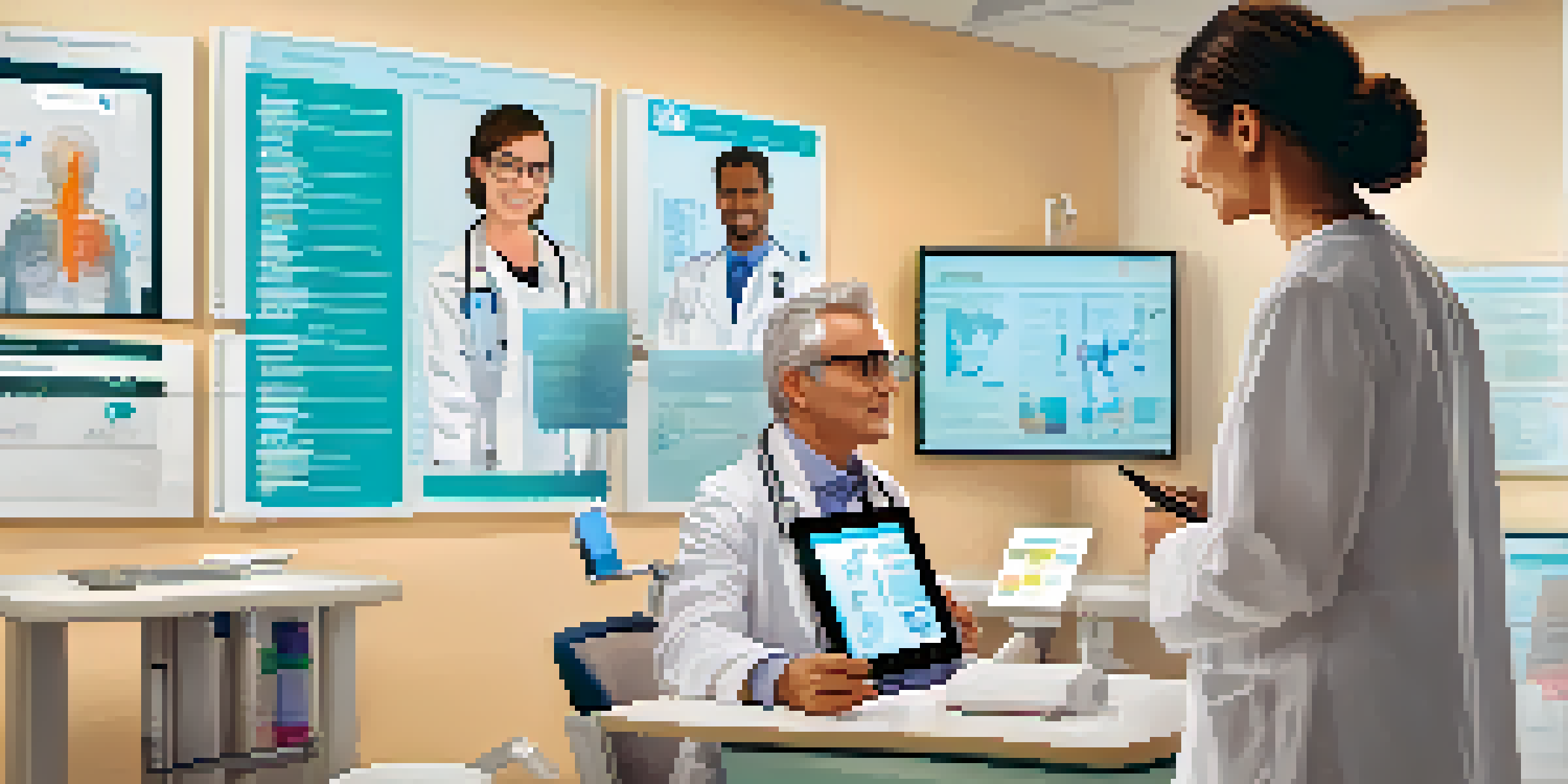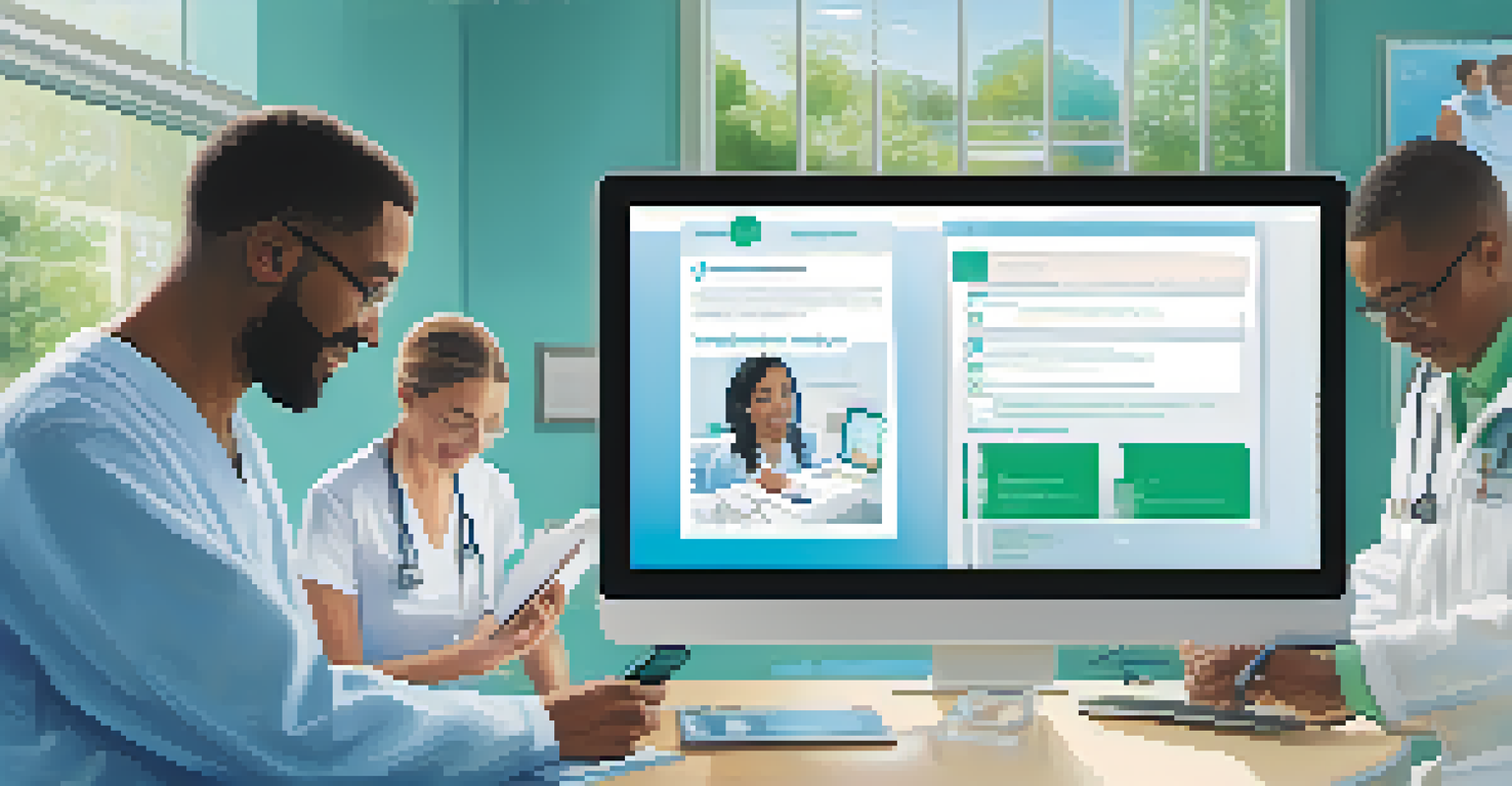The Role of EHRs in Patient-Centered Care Strategies

Understanding Patient-Centered Care and EHRs
Patient-centered care focuses on the preferences, needs, and values of patients, ensuring that they are active participants in their healthcare. Electronic Health Records (EHRs) play a pivotal role in this approach by providing a comprehensive view of a patient's medical history. This accessibility allows healthcare providers to tailor treatments to individual needs, enhancing the overall patient experience.
In healthcare, as in life, it's all about the relationships we build. The stronger the bond between patient and provider, the better the care we deliver.
EHRs facilitate real-time access to patient data, which is crucial for making informed decisions. Imagine a doctor being able to review not just the current symptoms but also previous treatments and responses in one glance. This immediacy helps build a trusting relationship between patients and healthcare providers, essential for effective care.
Moreover, EHRs can integrate patient preferences and feedback directly into the system, ensuring that their voices are heard. This integration fosters a collaborative environment where patients feel valued and understood, ultimately leading to better health outcomes.
Enhancing Communication with EHRs
Effective communication is at the heart of patient-centered care, and EHRs significantly enhance this aspect. With features like secure messaging and patient portals, EHRs enable seamless communication between patients and healthcare teams. This ensures that patients can ask questions, express concerns, and receive timely updates about their care.

For instance, a patient can easily access their lab results through a patient portal and ask their doctor for clarification if needed. This direct line of communication not only empowers patients but also reduces the chances of misunderstandings, making the healthcare process smoother for everyone involved.
Patient Empowerment through EHRs
EHRs give patients access to their health records, enabling them to take an active role in managing their healthcare.
Additionally, EHRs can send reminders for appointments or medication refills, keeping patients engaged in their healthcare journey. This proactive approach encourages adherence to treatment plans and fosters a sense of responsibility in managing their health.
Supporting Care Coordination through EHRs
Care coordination is crucial for ensuring that patients receive comprehensive and cohesive care. EHRs facilitate this by allowing different healthcare providers to share information easily and securely. This means that a specialist can access a patient's primary care records, ensuring that all parties are on the same page about the patient's health.
The greatest medicine of all is to teach people how not to need it.
Imagine a patient visiting multiple specialists for a chronic condition. With EHRs, all their healthcare providers can view the same information, reducing the risk of duplicate tests or conflicting treatments. This not only saves time but also minimizes potential complications arising from miscommunication.
Furthermore, EHRs can help identify gaps in care and alert providers when follow-up actions are needed. This proactive approach ensures that patients receive timely interventions, enhancing their overall health and well-being.
Empowering Patients with EHR Access
One of the most significant benefits of EHRs is the empowerment they provide to patients. By granting access to their health records, patients can take an active role in managing their health. This transparency builds trust and encourages them to engage with their healthcare providers more effectively.
Patients can review their medical history, understand their diagnoses, and track their health metrics over time. For example, a patient with diabetes can monitor their blood sugar levels and see how lifestyle changes affect their readings. This level of involvement can lead to better health management and improved outcomes.
Enhanced Communication with EHRs
EHRs facilitate seamless communication between patients and healthcare providers, ensuring timely updates and reducing misunderstandings.
EHRs also allow patients to update their information, such as allergies or medications, ensuring that their records are always current. This not only enhances the quality of care but also helps providers deliver more personalized treatment based on accurate data.
Utilizing Data Analytics for Improved Care
EHRs are not just repositories of information; they also provide valuable data analytics capabilities. By analyzing aggregate patient data, healthcare organizations can identify trends and patterns that inform care strategies. This data-driven approach enhances the overall quality of care and supports proactive health management.
For instance, if a large population of patients shows an increase in a particular health issue, healthcare providers can address this with targeted interventions. EHRs allow for the identification of at-risk populations, enabling providers to tailor their outreach and prevention strategies effectively.
Moreover, data analytics can help track the effectiveness of different treatment modalities, guiding future healthcare decisions. This evidence-based approach optimizes patient outcomes and ensures that care strategies are continually evolving to meet changing needs.
Ensuring Privacy and Security in EHRs
As valuable as EHRs are, they also raise concerns about privacy and security. Protecting patient information is paramount, and healthcare organizations must implement robust security measures. This includes encryption, access controls, and regular audits to safeguard sensitive data against breaches.
Patients need to feel confident that their personal health information is secure. When they trust that their data is protected, they are more likely to be open with their healthcare providers, enhancing the overall patient-provider relationship. It's essential for healthcare organizations to communicate their security measures clearly to reassure patients.
Improved Care Coordination via EHRs
EHRs enable healthcare providers to share patient information securely, ensuring cohesive care and minimizing the risk of conflicting treatments.
Additionally, educating patients on their rights regarding their health information can empower them. When patients understand how their data is used and what protections are in place, they can engage more fully in their care journey.
The Future of EHRs in Patient-Centered Care
The landscape of healthcare is continuously evolving, and EHRs are at the forefront of this transformation. As technology advances, we can expect EHRs to become even more sophisticated, incorporating artificial intelligence and machine learning to enhance patient care. These innovations could lead to more personalized treatment plans that adapt to individual patient needs in real-time.
Moreover, the integration of telehealth services with EHRs is becoming increasingly important. Patients can now have virtual consultations while still accessing their medical records, making the healthcare experience more flexible and accessible. This is particularly beneficial for those with mobility issues or those living in remote areas.

Ultimately, the future of EHRs lies in their ability to further empower patients and streamline care processes. As we continue to prioritize patient-centered care, EHRs will play a critical role in shaping a more inclusive and effective healthcare system.